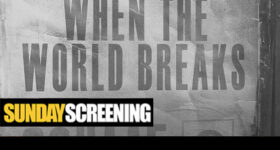Although his communications may have been ‘partly restored’ in recent days, Wikileaks founder Julian Assange continues to be denigrated largely by Western governments and media – and even by his own host country, Ecuador, of which he is a citizen.
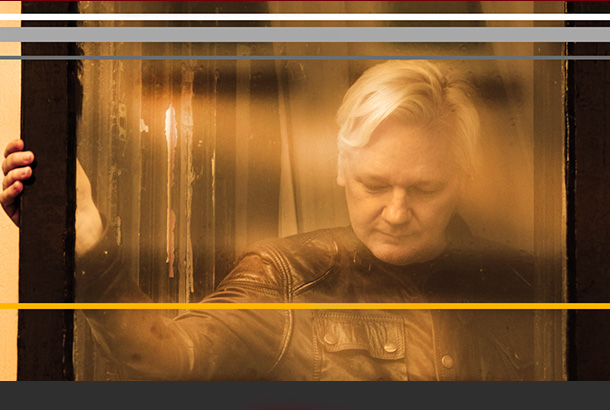
It’s widely known that when Assange and Wikileaks began their project in 2006, and later came to international prominence with the publishing of a series of leaks from then-Bradley Manning, “western liberals and quite a few Establishment figures loved them,” writes Neil Clark.
The problem for the whistleblower organization largely began when it stayed true to its mission to ‘open ALL governments’ – including those in the West. That also posed a problem for the West, and especially for the U.S. and U.K., because the information Wikileaks released to the public has never been proven wrong.
Wikileaks has a 100% perfect record on the facts in those reports.
Further, here’s a list of past awards Assange, Wikileaks and its journalists have collectively received:
- The Economist New Media Award (2008)
- The Amnesty New Media Award (2009)
- TIME Magazine Person of the Year, People’s Choice (highest global vote) (2010)
- The Sam Adams Award for Integrity (2010)
- The National Union of Journalists Journalist of the Year (Hrafnsson) (2011)
- The Sydney Peace Foundation Gold Medal (2011)
- The Martha Gellhorn Prize for Journalism (2011)
- The Blanquerna Award for Best Communicator (2011)
- The Walkley Award for Most Outstanding Contribution to Journalism (2011)
- The Voltaire Award for Free Speech (2011)
- The International Piero Passetti Journalism Prize of the National Union of Italian Journalists (2011)
- The Jose Couso Press Freedom Award (2011)
- The Privacy International Hero of Privacy (2012)
- The Global Exchange Human Rights People’s Choice Award (2013)
- The Yoko Ono Lennon Courage Award for the Arts (2013)
- The Brazillian Press Association Human Rights Award (2013)
- The Kazakstan Union of Journalists Top Prize (2014)
As well as nominations for the UN Mandela Prize (2015) and nominations in six consecutive years for the Nobel Peace Prize (2010-2015)
WikiLeaks is cited in more than 28 thousands academic papers and US court filings
Source: Wikileaks.org
The level of recognition and admiration for the work of Assange and his organization is staggeringly impressive. The accolades and citations received would put most newsrooms to shame. Then why all the coordinated smears, threats and censorship?
Looking to history as a guide and likely explanation, the following commentary provides a ‘snapshot of Wikileaks’ revelations’ focusing mainly on British foreign policy in the Middle East.
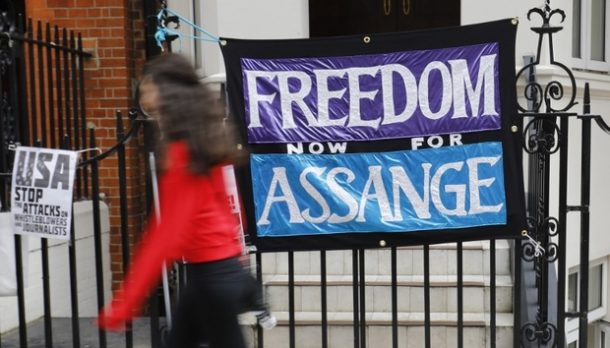
A pedestrian passes a banner reading ‘Freedom for Assange’ outside the Ecuadorian embassy on 30 July 2018 (Photo: AFP)
Mark Curtis
Middle East Eye
The UK government is ignoring a UN ruling that determined the Wikileaks founder was being held in ‘arbitrary detention’ at the Ecuadorian embassy
Twelve years ago this month, WikiLeaks began publishing government secrets that the world public might otherwise never have known. What it has revealed about state duplicity, human rights abuses and corruption goes beyond anything published in the world’s “mainstream” media.
After over six months of being cut off from outside world, on 14 October Ecuador has partly restored Wikileaks founder Julian Assange’s communications with the outside world from its London embassy where the founder has been living for over six years.
The treatment – real and threatened – meted out to Assange by the US and UK governments contrasts sharply with the service Wikileaks has done their publics in revealing the nature of elite power, as shown in the following snapshot of Wikileaks’ revelations about British foreign policy in the Middle East.
Conniving with the Saudis
Whitehall’s special relationship with Riyadh is exposed in an extraordinary cable from 2013 highlighting how Britain conducted secret vote-trading deals with Saudi Arabia to ensure both states were elected to the UN human rights council. Britain initiated the secret negotiations by asking Saudi Arabia for its support.
Cables show Miliband approved a loophole created by diplomats to allow US cluster bombs to remain on UK soil
The Wikileaks releases also shed details on Whitehall’s fawning relationship with Washington. A 2008 cable, for example, shows then shadow foreign secretary William Hague telling the US embassy that the British “want a pro-American regime. We need it. The world needs it.”
A cable the following year shows the lengths to which Whitehall goes to defend the special relationship from public scrutiny. Just as the Chilcot inquiry into the Iraq War was beginning in 2009, Whitehall promised Washington that it had “put measures in place to protect your interests”.
American influence
It is not known what this protection amounted to, but no US officials were called to give evidence to Chilcot in public. The inquiry was also refused permission to publish letters between former US President George W Bush and former UK Prime Minister Tony Blair written in the run-up to the war.
Also in 2009, then prime minister Gordon Brown raised the prospect of reducing the number of British nuclear-armed Trident submarines from four to three, a policy opposed in Washington. However, Julian Miller, an official in the UK’s Cabinet Office, privately assured US officials that his government “would consult with the US regarding future developments concerning the Trident deterrent to assure there would be ‘no daylight’ between the US and UK”. The idea that British decision-making on Trident is truly independent of the US is undermined by this cable.
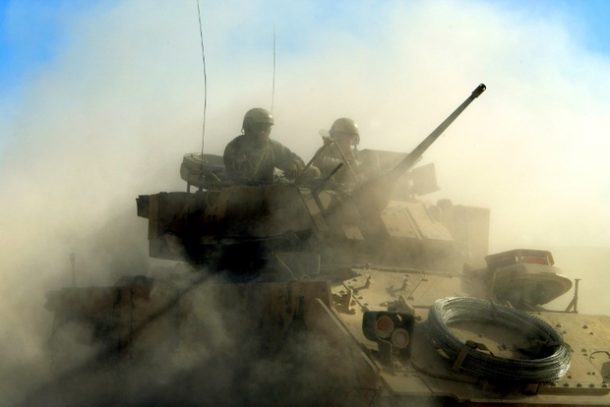
US troops leave their base in Tikrit, Iraq, on 21 November 2003 (AFP)
The Wikileaks cables are rife with examples of British government duplicity of the kind I’ve extensively come across in my own research on UK declassified files. In advance of the British-NATO bombing campaign in Libya in March 2011, for example, the British government pretended that its aim was to prevent Libyan leader Muammar Gaddafi’s attacks on civilians and not to overthrow him.
However, Wikileaks files released in 2016 as part of its Hillary Clinton archive show William Burns, then the US deputy secretary of state, having talked with foreign secretary William Hague about a “post-Qaddafi” Libya. This was more than three weeks before military operations began. The intention was clearly to overthrow Gaddafi, and the UN resolution about protecting civilians was simply window dressing.
Deception over Diego Garcia
Another case of British duplicity concerns Diego Garcia, the largest island in the Chagos archipelago in the Indian Ocean, which is now a major US base for intervention in the Middle East. The UK has long fought to prevent Chagos islanders from returning to their homeland after forcibly removing them in the 1960s.
A secret 2009 cable shows that a particular ruse concocted by Whitehall to promote this was the establishment of a “marine reserve” around the islands. A senior Foreign Office official told the US that the “former inhabitants would find it difficult, if not impossible, to pursue their claim for resettlement on the islands if the entire Chagos Archipelago were a marine reserve”.
A week before the “marine reserve” proposal was made to the US in May 2009, then UK foreign secretary David Miliband was also conniving with the US, apparently to deceive the public. A cable reveals Miliband helping the US to sidestep a ban on cluster bombs and keep the weapons at US bases on UK soil, despite Britain signing the international treaty banning the weapons the previous year.
Miliband approved a loophole created by diplomats to allow US cluster bombs to remain on UK soil and was part of discussions on how the loophole would help avert a debate in parliament that could have “complicated or muddied” the issue. Critically, the same cable also revealed that the US was storing cluster munitions on ships based at Diego Garcia.
Spying on the UK
Cables show the US spying on the Foreign Office, collecting information on British ministers. Soon after the appointment of Ivan Lewis as a junior foreign minister in 2009, US officials were briefing the office of US Secretary of State Hillary Clinton about rumours that he was depressed and had a reputation as a bully, and on “the state of his marriage”.
Washington was also shown to have been spying on the UK mission to the UN, along with other members of the Security Council and the UN Secretary General.
The document refers to investigative journalists as “threats” alongside subversive and terrorist organisations, noting that “the ‘enemy’ is unwelcome publicity of any kind, and through any medium”
In addition, Wikileaks cables reveal that journalists and the public are considered legitimate targets of US intelligence operations. In October 2009, Joint Services Publication 440, a 2,400-page restricted document written in 2001 by the Ministry of Defence, was leaked. Somewhat ironically, it contained instructions for the security services on how to avoid leaks of information by hackers, journalists, and foreign spies.
The document refers to investigative journalists as “threats” alongside subversive and terrorist organisations, noting that “the ‘enemy’ is unwelcome publicity of any kind, and through any medium”.
Britain’s GCHQ is also revealed to have spied on Wikileaks itself – and its readers. One classified GCHQ document from 2012 shows that GCHQ used its surveillance system to secretly collect the IP addresses of visitors to the Wikileaks site in real time, as well as the search terms that visitors used to reach the site from search engines such as Google.
Championing free media
The British government is punishing Assange for the service that Wikileaks has performed. It is ignoring a UN ruling that he is being held in “arbitrary detention” at the Ecuadorian embassy, while failing, illegally, to ensure his health needs are met. Whitehall is also refusing to offer diplomatic assurances that Assange will not be extradited to the US – the only reason he remains in the embassy.
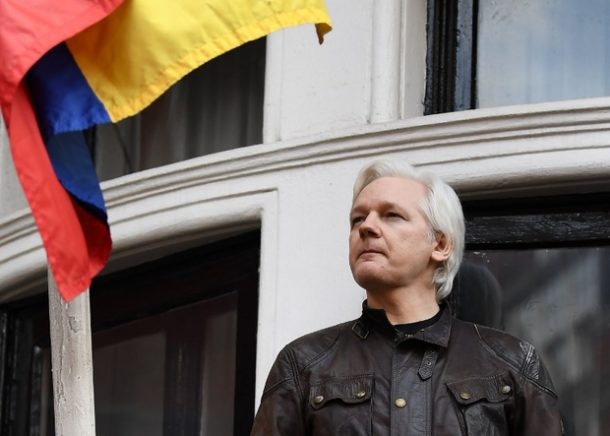
Wikileaks founder Julian Assange speaks to the media from the balcony of the Ecuadorian embassy in London on 19 May 2017 (AFP)
Smear campaigns have portrayed Assange as a sexual predator or a Russian agent, often in the same media that have benefitted from covering Wikileaks’ releases.
Many journalists and activists who are perfectly aware of the fake news in some Western media outlets, and of the smear campaign against Labour leader Jeremy Corbyn, are ignoring or even colluding in the more vicious smearing of Assange.
More journalists need to champion the service Wikileaks performs and argue for what is at stake for a free media in the right to expose state secrets.
***
This column was originally published at Middle East Eye
Mark Curtis is a historian and analyst of UK foreign policy and international development and the author of six books, the latest being an updated edition of Secret Affairs: Britain’s Collusion with Radical Islam.
READ MORE JULIAN ASSANGE NEWS AT: 21st Century Wire Julian Assange Files
SUPPORT 21WIRE – SUBSCRIBE & BECOME A MEMBER @21WIRE.TV













